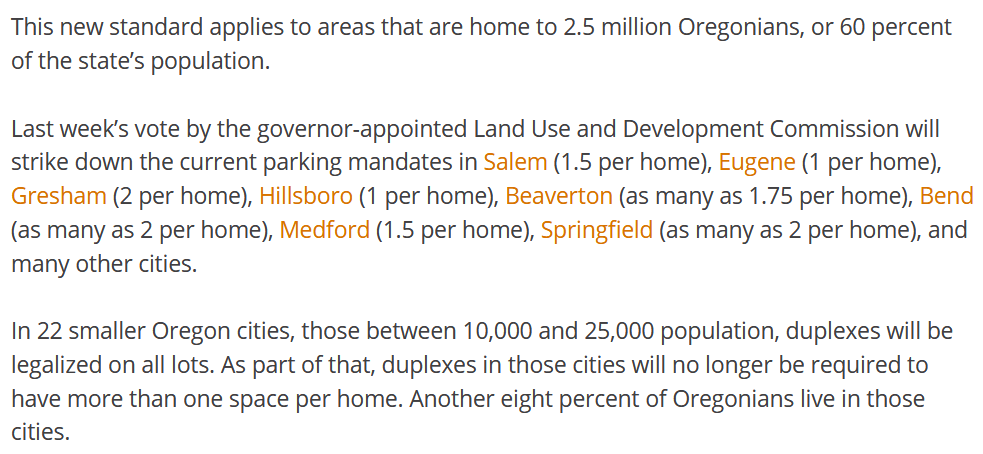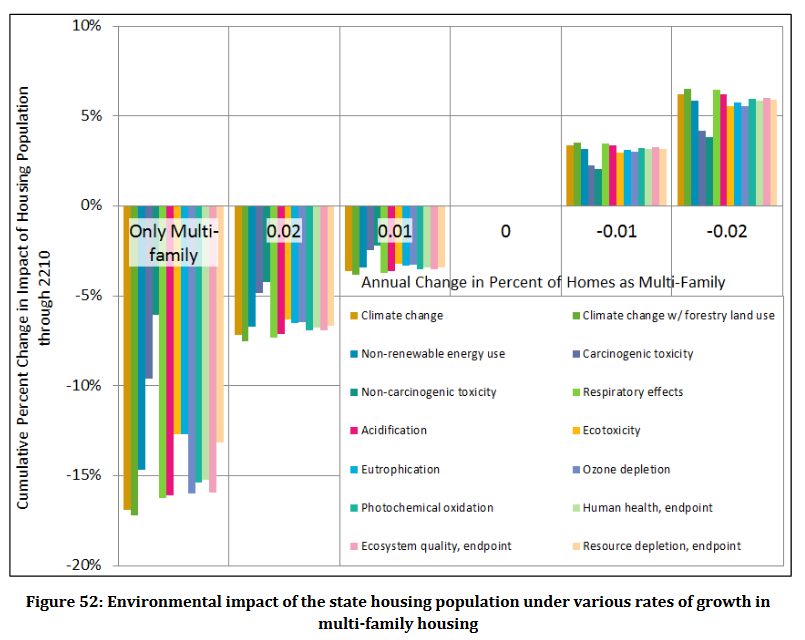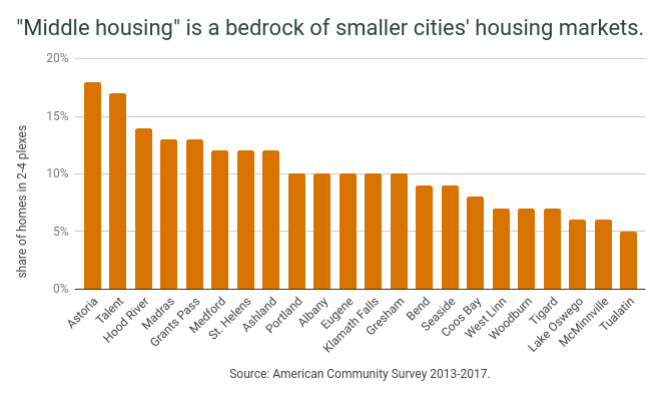
No law should require someone to pay for parking spaces they don't need.
Oregon just slashed parking requirements statewide. First state-level action of its kind in US history ❤️🌎🏘️
sightline.org/2020/12/14/ore…
Oregon just slashed parking requirements statewide. First state-level action of its kind in US history ❤️🌎🏘️
sightline.org/2020/12/14/ore…
The rule applies specifically to "middle housing": duplexes, 3plexes, 4plexes, townhomes & clustered cottages.
In most states that'd be a sweet change, but wouldn't matter too much.
But in Oregon, the same law legalized middle housing on almost every urban lot in the state. So.
In most states that'd be a sweet change, but wouldn't matter too much.
But in Oregon, the same law legalized middle housing on almost every urban lot in the state. So.
Specifics: this caps local parking requirements based on lot size.
lots of 3,000sqft or less: cities/counties can require 1 off-street parking space, total, for the first 4 homes
3k-5k square feet: 2 spaces total
5k-7k: 3 spaces total
7k+: 4 spaces total
lots of 3,000sqft or less: cities/counties can require 1 off-street parking space, total, for the first 4 homes
3k-5k square feet: 2 spaces total
5k-7k: 3 spaces total
7k+: 4 spaces total
Important note: Property owners are allowed to build more parking than that IF THEY WANT TO, and for the forseeable future, many will want to.
What this does is let more homes exist SPECIFICALLY in areas where car ownership is a little less important.
What this does is let more homes exist SPECIFICALLY in areas where car ownership is a little less important.
In other words, it doesn't *push* any neighborhood through the door to becoming more walkable, bikeable and transit-oriented.
It just *opens* the door.
The parking mandates applied by virtually every city in the mid to late 1900s had locked that door, by law.
It just *opens* the door.
The parking mandates applied by virtually every city in the mid to late 1900s had locked that door, by law.
These new rules, unanimously approved Wednesday as part of rulemaking around a bill approved by Oregon's legislature in 2019, affect all residential lots in the jurisdictions in which most Oregonians live. 

How do parking mandates kill housing? Well, you try to fit more usable off-street parking spaces on the site of this hypothetical new fourplex. 

This is the sort of thing a new fourplex is required to look like under the current rules in many cities, including Oregon's until now: 1.5 spaces per home.
The thing that drives me most bonkers here: THE DRIVEWAYS ELIMINATED THE CURBSIDE PARKING
(also the space for trees 🌳)
The thing that drives me most bonkers here: THE DRIVEWAYS ELIMINATED THE CURBSIDE PARKING
(also the space for trees 🌳)

Who suffers most when we make off-street parking mandatory? Poorer folks who don't own cars.
But OR's new cap affects cities of just 25k people, & cities down to 10k can have duplexes with just 2 spaces total. How many Americans don't own cars in small cities?
Quite a few!
But OR's new cap affects cities of just 25k people, & cities down to 10k can have duplexes with just 2 spaces total. How many Americans don't own cars in small cities?
Quite a few!

When we make off-street parking mandatory, we effectively discriminate against the many low-income tenant households who don't need it.
Again, many people do need parking! But making that call from city hall, for the indefinite future, is a bad one-size-fits-all way to go.
Again, many people do need parking! But making that call from city hall, for the indefinite future, is a bad one-size-fits-all way to go.

One of my fave things about the chart above is the dip in car ownership among the very wealthy.
In other words, when you have the option to do without a car by spending lots of money on housing instead, many do.
In other words, when you have the option to do without a car by spending lots of money on housing instead, many do.
Wouldn't it be nice for the rest of us if everyone had that option? We should make low-car life possible in more places for more people who want it.
That goal requires making parking more optional. OR just did so for a few housing types.
That goal requires making parking more optional. OR just did so for a few housing types.
What about parking mandates at larger apartments & businesses? Not gone yet!
Let me know if you want to get involved in a campaign to further reduce parking mandates across the Portland metro area.
Let me know if you want to get involved in a campaign to further reduce parking mandates across the Portland metro area.
I'll finish my article & this thread with a point about politics. @ambrown already screengrabbed it: 

Here's our full article about Oregon's big new parking reform. Thanks for reading & LMK what I missed! sightline.org/2020/12/14/ore…
• • •
Missing some Tweet in this thread? You can try to
force a refresh









